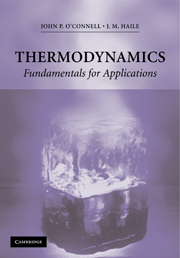Preface
Published online by Cambridge University Press: 05 June 2012
Summary
Thermodynamics is fundamental and applicable to all technical endeavors. Its two brief laws provide a complete basis for establishing the states of pure substances and their mixtures. It shows us the directions in which those states tend to change when systems are prodded by external forces. It provides a secure foundation for scientific investigations into all forms of matter. It reveals constraints on interconversions of heat and work, on separations of components from solutions, and on ultimate extents of chemical reactions. It can guide screening for feasibility of alternative processes, and when a design has been selected, it can contribute to the optimization of that design.
Although thermodynamics describes natural phenomena, those descriptions are in fact products of creative, systematic, human minds. Nature unfolds without any explicit reference to energy, entropy, or fugacity; these are unnatural concepts created by humans. Nevertheless, the complexities observed in Nature can be organized by appealing to thermodynamic methodology. With proper understanding, generalized thermodynamic techniques can be used to deal effectively with many aspects of reality. But to gain that understanding, thermodynamics must be studied in a systematic way that uncovers its structure and economy.
Thermodynamic ideas originated almost 200 years ago, but the subject continues to evolve. Although some claim that “there is nothing new in thermodynamics,” scholars still find challenges in its abstractness, rigor, and universality. They debate the “best” ways to phrase its basic principles and to identify the limits of its application.
- Type
- Chapter
- Information
- ThermodynamicsFundamentals for Applications, pp. xiii - xvPublisher: Cambridge University PressPrint publication year: 2005



